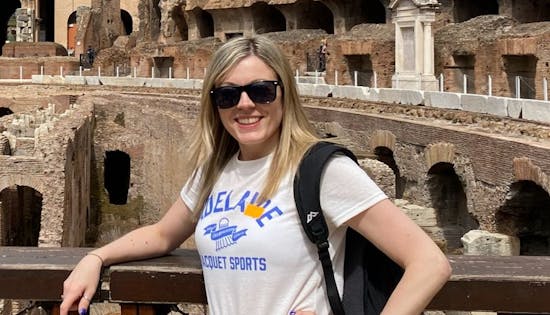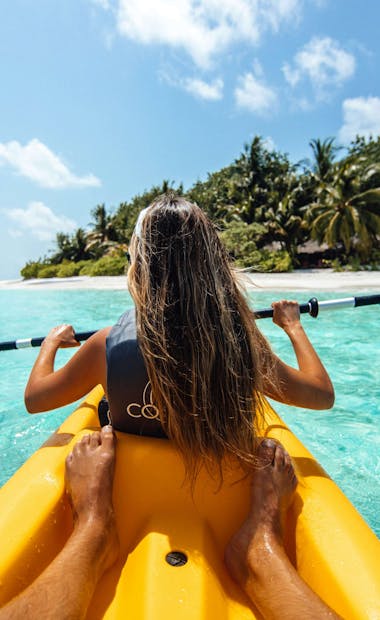Egypt Getaways
Visit the Pyramids of Giza, cruise the Nile and explore The Valley of The Kings
Popular tours
- Save31%
 View Tour
View TourBest of Egypt - 8 Days
- Cairo to Cairo
- Age group: 12 - 100
- Max group size: 16
Was:£1,169From£810 - Save16%
 View Tour
View TourHighlights of Egypt - 14 Days
- Cairo to Cairo
- Age group: 12 - 100
- Max group size: 16
Was:£1,819From£1,531 - Save21%
 View Tour
View TourEgypt: Boats & Bazaars - 8 Days
- Cairo to Cairo
- Age group: 18 - 39
- Max group size: 18
Was:£599From£474 - Save35%
 View Tour
View TourKing Ramses Nile Cruise (And Optional Flight) - 13 Days
- Cairo to Cairo
- Age group: 15 - 99
- Max group size: 24
Was:£2,830From£1,851 - Save16%
 View Tour
View TourClassic Egypt - 8 Days
- Cairo to Cairo
- Age group: 15 - 99
- Max group size: 12
Was:£1,690From£1,422 - Save16%
 View Tour
View TourEgypt Family Holiday - 9 Days
- Cairo to Hurghada
- Age group: 5 - 99
- Max group size: 16
Was:£1,560From£1,313
Egypt Tours
Welcome to Egypt, the land of pharaohs, pyramids, and a tapestry of rich history and breathtaking wonders. Embark on an unforgettable journey through this mesmerizing country with our exclusive Egypt tours and holidays. From the bustling streets of Cairo to the serene banks of the Nile, Egypt offers a myriad of experiences that will leave you in awe.
Egypt tours are an ideal way to explore this ancient land, where every corner holds a story waiting to be told. Let the echoes of the past guide you as you marvel at the Great Pyramids of Giza, standing proudly as a testament to human ingenuity and architectural brilliance. Witness the enigmatic Sphinx, a guardian of secrets and a symbol of mystery.
Beyond the pyramids, delve into the enchanting world of the Nile River, the lifeline of Egypt. Sail along its tranquil waters aboard a traditional felucca or a luxurious cruise ship, relishing the timeless beauty of the surrounding landscapes. Experience the mesmerizing allure of Luxor, often called an open-air museum, where the Valley of the Kings and the iconic temples of Karnak and Luxor transport you back in time.
As you venture south, be captivated by the remarkable city of Aswan, where the legendary Abu Simbel temples proudly defy the sands of time. Immerse yourself in the vibrant souks of Aswan, where fragrant spices, colorful textiles, and exquisite handicrafts await your discovery.
No visit to Egypt would be complete without exploring the captivating city of Alexandria, a melting pot of cultures and a testament to the country's cosmopolitan past. Stroll along its magnificent Corniche, visit the Bibliotheca Alexandrina, and witness the mesmerizing blend of ancient and modern in this coastal gem.
For those seeking an oasis of tranquility, the Western Desert beckons with its breathtaking landscapes. Discover the ethereal beauty of the White Desert, with its surreal rock formations that resemble a lunar landscape. Marvel at the Bahariya Oasis, a lush haven surrounded by golden dunes, and explore the ancient ruins of the Temple of Alexander the Great.
Beyond its historical treasures, Egypt offers a myriad of vibrant experiences. Dive into the underwater wonders of the Red Sea, where vibrant coral reefs and exotic marine life create an underwater paradise for snorkelers and divers alike. Explore the vibrant chaos of Cairo's markets, where the aromas of spices and the vibrant colors of textiles create a sensory overload.
Egypt is a destination that embraces the past while embracing the future. Its blend of ancient wonders and modern charm creates an enchanting tapestry that captivates travelers from around the world. With our carefully curated Egypt tours and holidays, we invite you to embark on a journey of discovery, immersing yourself in the timeless allure of this remarkable country. Unravel the secrets of the pharaohs, bask in the warmth of its people, and create memories that will last a lifetime. Choose Egypt, and let its magic unfold before your eyes.
When is the best time to visit Egypt?
The best time to visit Egypt largely depends on your preferences and the experiences you seek. Egypt experiences a desert climate, with hot summers and mild winters. However, there are certain seasons that are more favorable for exploring this magnificent country.
For most travelers, the ideal time to visit Egypt is during the cooler months from October to April. During this period, temperatures are more pleasant, ranging from around 20°C (68°F) to 30°C (86°F), making it easier to explore the ancient sites and enjoy outdoor activities. It's also the peak tourist season, so popular attractions may be more crowded.
If you prefer to avoid the crowds and don't mind the hotter temperatures, visiting Egypt during the shoulder seasons of spring (March to May) and autumn (September to November) can be a good option. During these months, the weather is still relatively mild, and you may find better deals on accommodations and tours.
Summer in Egypt, from May to August, can be extremely hot, with temperatures soaring well above 40°C (104°F) in some areas. However, if you can handle the heat and don't mind fewer crowds, you can still enjoy your visit by planning outdoor activities for early mornings or evenings when temperatures are more tolerable.
It's important to note that the weather can vary across different regions of Egypt. Coastal areas, such as Alexandria and the Red Sea resorts, tend to have milder temperatures compared to inland cities like Luxor and Aswan. So, consider the specific regions you plan to visit and their climatic conditions when deciding on the best time for your Egypt adventure.
Ultimately, the best time to visit Egypt is when you feel most comfortable and can make the most of your desired experiences. Whether you choose to explore during the peak season or venture during quieter times, Egypt's captivating treasures await your discovery year-round.
Will I need a visa to travel to Egypt?
Yes, most travelers visiting Egypt will need a visa. However, the specific visa requirements can vary depending on your nationality and the purpose and duration of your visit. Here is some general information regarding visas for Egypt:
Tourist Visa: If you plan to visit Egypt for tourism purposes, you will typically need to obtain a tourist visa. Tourist visas can be obtained in advance from Egyptian embassies or consulates in your home country. Alternatively, many nationalities have the option to obtain a visa on arrival at major Egyptian airports and land border crossings. It's important to check the requirements and availability of visa on arrival for your specific nationality prior to travel.
Visa on Arrival: If you are eligible for a visa on arrival, you can obtain it upon arrival at Cairo International Airport, Hurghada International Airport, Sharm El-Sheikh International Airport, and other designated entry points. The visa on arrival is usually valid for a maximum stay of 30 days and can be extended if needed.
E-Visa: Egypt also offers an electronic visa (e-Visa) system, which allows travelers to apply for a visa online before their trip. The e-Visa is available for citizens of eligible countries and provides a convenient way to obtain a visa in advance.
It is essential to check the latest visa requirements and regulations for your specific nationality before traveling to Egypt. You can consult the official website of the Egyptian embassy or consulate in your home country or contact your local embassy for the most up-to-date information.
Additionally, make sure that your passport is valid for at least six months beyond your intended departure date from Egypt.
Remember that visa requirements can change, so it's always wise to stay informed and allow ample time for visa application and processing before your planned travel dates.
What are the must see destinations in Egypt?
Egypt is a treasure trove of must-see destinations, each offering a unique glimpse into its rich history and vibrant culture. Here are some of the top must-visit destinations in Egypt:
Cairo: Egypt's bustling capital city is a vibrant blend of ancient wonders and modern charm. Explore the iconic Giza Plateau, home to the Great Pyramids of Giza and the enigmatic Sphinx. Visit the world-renowned Egyptian Museum, where you can marvel at the treasures of Tutankhamun and other ancient artifacts. Don't miss the historic Islamic Cairo district, with its medieval mosques, bustling bazaars, and the majestic Citadel of Saladin.
Luxor: Known as the "world's greatest open-air museum," Luxor is a treasure trove of ancient Egyptian sites. Explore the sprawling Karnak Temple Complex, where grand temples, towering columns, and sacred lakes tell stories of pharaonic glory. Cross the Nile to the West Bank and discover the Valley of the Kings, the final resting place of pharaohs, including Tutankhamun. Explore the mortuary temple of Hatshepsut and the towering Colossi of Memnon.
Aswan: Nestled on the banks of the Nile, Aswan offers a serene escape and a gateway to ancient wonders. Explore the magnificent Philae Temple, dedicated to the goddess Isis, which was relocated to Agilkia Island to save it from the rising waters of the Nile. Visit the Unfinished Obelisk, a massive granite monument that provides insights into ancient stone-cutting techniques. Take a relaxing felucca sailboat ride and witness the beautiful Nubian villages along the river.
Abu Simbel: This awe-inspiring archaeological site in southern Egypt is home to the magnificent Abu Simbel temples. Carved into the mountainside, the Great Temple of Ramses II and the Temple of Hathor are masterpieces of ancient Egyptian architecture and a testament to the pharaoh's power and devotion. The temples were relocated in an incredible engineering feat to protect them from the rising waters of Lake Nasser.
Alexandria: Delve into Egypt's cosmopolitan past by visiting the enchanting city of Alexandria. Explore the fascinating Catacombs of Kom El Shoqafa, a necropolis of intertwined Roman, Egyptian, and Greek influences. Visit the impressive Qaitbay Citadel, a medieval fortress perched on the Mediterranean coast. Stroll along the beautiful Corniche, enjoy the lively atmosphere of the Alexandria Library, and savor the city's vibrant arts and culinary scene.
Red Sea Coast: For beach and diving enthusiasts, the Red Sea coast offers spectacular underwater adventures. Explore the resort towns of Hurghada and Sharm El Sheikh, where crystal-clear waters, vibrant coral reefs, and a multitude of marine life await. Whether you are a beginner or an experienced diver, the Red Sea offers unforgettable underwater experiences.
These are just a few highlights of Egypt's remarkable destinations. The country is filled with countless other treasures, including the temples of Edfu and Kom Ombo, the White Desert, the coastal town of Dahab, and the vibrant markets of Khan El Khalili in Cairo. Each destination tells a different chapter of Egypt's captivating story, making it a truly magical and diverse destination to explore.
What is the local currency in Egypt, and can I use credit cards?
The local currency in Egypt is the Egyptian Pound (EGP). It is advisable to have some local currency with you for small purchases, tipping, and transactions in more remote areas. You can exchange your currency for Egyptian Pounds at banks, currency exchange offices, and authorized exchange counters at airports and major tourist areas.
Credit cards are widely accepted in larger hotels, restaurants, and shops in major cities and tourist areas. Visa and Mastercard are the most commonly accepted cards, while American Express may have more limited acceptance. However, it's important to note that in more rural or smaller establishments, cash is often preferred.
Before your trip, it is advisable to inform your bank or credit card provider about your travel plans to Egypt to avoid any issues with using your cards abroad. Additionally, check if your credit card company charges any foreign transaction fees and inform yourself about the current exchange rates.
ATMs are readily available in major cities and tourist areas, allowing you to withdraw Egyptian Pounds using your debit or credit card. It's recommended to use ATMs located in well-lit and secure areas, such as inside banks or shopping malls, to ensure safety and reliability.
Keep in mind that it's always a good idea to have a mix of payment options, including cash and cards, for flexibility and to cater to different situations and establishments.
Is Egypt a good family holiday destination?
Absolutely! Egypt can be a fantastic destination for a family holiday, offering a blend of educational experiences, cultural immersion, and exciting adventures that will create lasting memories for everyone. Here are some reasons why Egypt is an excellent choice for a family vacation:
Ancient Wonders: Egypt's rich history and ancient wonders provide a unique learning experience for children and adults alike. Exploring iconic sites such as the Pyramids of Giza, the Sphinx, and the Valley of the Kings allows families to delve into the mysteries of ancient civilizations together.
Nile River Cruises: Embarking on a family-friendly Nile River cruise is a great way to combine relaxation and adventure. Cruise ships offer comfortable accommodations, onboard activities, and guided tours to significant historical sites along the Nile, ensuring an enriching and enjoyable experience for all family members.
Interactive Museums: Egypt is home to several museums that bring history to life in interactive and engaging ways. The Egyptian Museum in Cairo, for example, showcases a vast collection of artefacts, including the treasures of Tutankhamun. Children can learn about ancient Egypt through exhibits, interactive displays, and guided tours designed to captivate young minds.
Red Sea Adventures: Egypt's Red Sea coast offers a paradise for beach-loving families. Popular resort towns like Hurghada and Sharm El Sheikh provide opportunities for snorkelling, scuba diving, and water sports in stunning coral reefs teeming with colourful marine life. Many resorts also have dedicated kids' clubs and family-friendly facilities to keep the little ones entertained.
Desert Excursions: Exploring the Egyptian deserts can be an exciting adventure for families. Exploring the unique landscapes of the White Desert, children will be fascinated by the vastness and beauty of the desert while learning about its natural wonders.
Cultural Experiences: Egypt's vibrant culture and warm hospitality offer numerous opportunities for families to connect with locals and experience authentic traditions. From exploring local markets and trying traditional cuisine to visiting Nubian villages and participating in cultural workshops, families can gain a deeper understanding of Egypt's diverse heritage.
Family-friendly Accommodations: Egypt has a wide range of family-friendly accommodations, including resorts with spacious rooms, pools, and entertainment facilities suitable for children. Many hotels offer special amenities and services catering to families, such as kids' clubs, playgrounds, and babysitting services.
It's important to note that planning ahead and ensuring the safety and comfort of your family is essential. Researching family-friendly activities, considering the weather and travel logistics, and adhering to any necessary safety precautions will contribute to a successful and enjoyable family holiday in Egypt.
Is Egypt a good destination for solo travellers?
Yes, Egypt can be a fantastic destination for solo travelers. With its rich history, diverse landscapes, and warm hospitality, Egypt offers unique experiences that cater to solo adventurers. Here are some reasons why Egypt is a great choice for solo travel:
Rich Cultural Heritage: Egypt's ancient history and archaeological wonders provide solo travelers with endless opportunities for exploration and discovery. Whether you're exploring the Great Pyramids of Giza, wandering through ancient temples, or navigating the bustling streets of Cairo, you'll find yourself immersed in a world of captivating history and culture.
Warm and Welcoming Locals: Egyptians are renowned for their hospitality and friendliness towards visitors. Solo travelers can expect to be greeted with warmth and kindness, often finding themselves engaged in conversations and making connections with locals who are eager to share their culture and traditions.
Ease of Navigation: Egypt's well-established tourism infrastructure makes it relatively easy for solo travelers to navigate the country. From organized tours to reliable transportation options, getting around Egypt can be straightforward, allowing you to focus on enjoying your solo adventures.
Safety Precautions: While it's always important to exercise caution and be aware of your surroundings when traveling solo, Egypt is generally considered a safe destination for tourists. Taking common-sense precautions, such as avoiding isolated areas at night and staying informed about current travel advisories, will enhance your safety and peace of mind.
Diverse Experiences: Egypt offers a wide range of experiences that cater to different interests. Whether you're interested in history, adventure, diving, desert exploration, or cultural immersion, there's something for every solo traveler in Egypt. From exploring ancient sites to embarking on a Nile River cruise or diving in the Red Sea, the possibilities are endless.
Meeting Other Travelers: Egypt's popularity as a tourist destination means that you're likely to encounter fellow travelers from around the world. This provides opportunities to connect with like-minded individuals, share experiences, and even join group tours or activities if you wish to have company during parts of your journey.
As with any destination, it's important to exercise common-sense safety precautions, stay informed about local customs and regulations, and plan your itinerary in advance. Solo travel in Egypt can be incredibly rewarding, allowing you to embrace the country's treasures at your own pace while immersing yourself in its captivating history and culture.
Is Egypt a safe destination?
Egypt is generally a safe destination for tourists, and millions of visitors travel to the country each year without experiencing any issues. However, as with any travel destination, it's important to stay informed about the current situation and take necessary precautions to ensure your safety and well-being. Here are some important points to consider regarding safety in Egypt:
Government Travel Advisories: Before traveling to Egypt, it is recommended to check the travel advisories issued by your government or relevant authorities. These advisories provide up-to-date information about safety conditions, potential risks, and any specific areas or regions that should be avoided or approached with caution.
Tourist Areas and Major Cities: Popular tourist areas in Egypt, such as Cairo, Luxor, Aswan, and the Red Sea resorts, are generally considered safe for visitors. These areas have a strong presence of security forces and are well-equipped to handle tourism. However, it's still advisable to remain vigilant and take common-sense precautions, such as keeping an eye on your belongings and avoiding isolated or poorly lit areas at night.
Local Customs and Laws: Familiarize yourself with local customs, traditions, and laws before your trip to Egypt. Respect the cultural norms, dress modestly when visiting religious sites, and be mindful of local sensitivities. Adhering to local customs will not only show respect but also contribute to a positive and safe travel experience.
Public Transportation and Street Safety: When using public transportation, such as buses or trains, exercise caution and be aware of your belongings. Avoid displaying valuable items openly, and consider using licensed taxis or reputable transportation services. As with any busy city, be cautious of pickpocketing in crowded areas and remain alert to your surroundings.
Travel Insurance: It's highly recommended to have comprehensive travel insurance that covers medical emergencies, trip cancellations, and other unforeseen circumstances. Ensure that your insurance policy covers the activities you plan to engage in, such as adventure sports or diving, if applicable.
Local Advice and Guides: When in Egypt, seek advice from reputable sources such as hotel staff, tour guides, or official tourism authorities regarding local safety conditions, recommended areas to visit, and any potential risks. Their expertise and knowledge of the local situation can provide valuable insights and enhance your safety.
As with travel to any destination, staying informed, using common sense, and taking necessary precautions will contribute to a safe and enjoyable experience in Egypt.
Will I require any vaccinations to travel to Egypt?
Yes, it is recommended to have certain vaccinations before traveling to Egypt. The specific vaccinations you need may depend on various factors, including your vaccination history, current health status, the duration of your stay, and the areas you plan to visit in Egypt. It is important to consult with a healthcare professional or a travel medicine specialist well in advance of your trip to get personalized advice based on your individual circumstances. They will be able to provide the most up-to-date information and recommend the necessary vaccinations for your specific needs.
However, there are a few vaccinations that are commonly recommended for travelers to Egypt:
Routine Vaccinations: Ensure that your routine vaccinations, such as measles-mumps-rubella (MMR), diphtheria-tetanus-pertussis, varicella (chickenpox), polio, and influenza, are up to date.
Hepatitis A: Hepatitis A is recommended for most travelers to Egypt as the disease can be transmitted through contaminated food or water. The vaccine provides protection against this viral infection.
Typhoid: Typhoid fever can be contracted through contaminated food or water. The typhoid vaccine is recommended for travelers, especially if you plan to visit rural areas or areas with poor sanitation.
Hepatitis B: Hepatitis B is a viral infection that can be transmitted through contaminated blood or body fluids, including sexual contact. The vaccine is recommended for long-term travelers, those who may engage in risky behaviors, or those who may require medical treatment during their stay.
Rabies: If you plan to engage in outdoor activities or have significant contact with animals, such as visiting remote areas or working with animals, the rabies vaccine may be recommended.
Again, it is important to consult with a healthcare professional or travel medicine specialist to assess your specific vaccination needs based on your individual health and travel plans. They can provide you with the most accurate and up-to-date information regarding vaccinations and any other health precautions to take before traveling to Egypt.
How does the rooming work on tours?
Small group tours in Egypt typically involve a set itinerary where you travel with a group of fellow travellers and a tour leader/guide. Accommodation arrangements vary depending on the specific tour you choose. Here are some common aspects of rooming arrangements on small group tours:
Shared Rooms: In order to promote camaraderie and facilitate interaction among group members, most tours arrange shared accommodation. This means you will be paired with another member of the same gender from the group to share a room. Roommates may sometimes change periodically throughout the tour.
Single Supplement: If you prefer to have your own room and privacy, you may have the option to pay a single supplement fee. This additional fee allows you to have your own room for the duration of the tour. However, please note that single supplements can vary in cost and availability.
Roommate Matching: Tour operators usually offer roommate matching services, where they try to pair you with a suitable roommate based on your preferences, such as age range. This can help ensure compatibility and a more enjoyable experience for all participants.
Rooming Preferences: When booking your small group tour, it's important to communicate your rooming preferences to the tour operator. If you have specific requirements or preferences, such as sharing with a friend or a specific roommate request, it's advisable to inform the tour operator during the booking process.
It's important to carefully read the tour details and inclusions provided by the tour operator to understand their specific rooming policies. If having your own room is a priority, make sure to inquire about the availability of single supplements and any associated costs before booking your tour.
Keep in mind that while sharing a room with a fellow traveller can be a great way to meet new people and build connections, having your own room provides more privacy and flexibility. Consider your preferences and the dynamics of the tour when deciding whether to opt for a shared room or pay for a single supplement.
Remember to communicate your needs and preferences clearly with the tour operator during the booking process to ensure a comfortable and enjoyable accommodation experience on your small group tour in Egypt.
What is the food like in Egypt?
Egyptian cuisine is a delightful fusion of flavors, influenced by a rich history of diverse cultures and traditions. The food in Egypt is vibrant, aromatic, and reflects the country's agricultural abundance and proximity to the Mediterranean Sea. Here are some highlights of Egyptian cuisine:
Egyptian Street Food: Street food is an integral part of Egyptian culinary culture. You'll find an array of delicious and affordable options to tantalize your taste buds. Try the iconic falafel, known as "ta'ameya," made from ground fava beans or chickpeas and flavored with herbs and spices. Savor "koshari," a popular vegetarian dish consisting of rice, lentils, pasta, and a tangy tomato sauce topped with crispy onions. Other street food favorites include "fuul" (fava bean stew), "shawarma" (spit-roasted meat in flatbread), and "samosas" (fried pastries filled with savory fillings).
Mezze and Dips: Mezze, or appetizers, are an important part of Egyptian cuisine. Enjoy an assortment of flavorful dips and spreads such as "hummus" (chickpea dip), "baba ganoush" (roasted eggplant dip), and "tahini" (sesame seed paste). Accompany these with freshly baked pita bread for a delightful start to your meal.
Seafood Delights: Given its coastal location, Egypt offers a wide variety of delicious seafood dishes. Freshly grilled fish, such as sea bass or red mullet, is a popular choice. "Sayadia" is a traditional fish dish cooked with rice, caramelized onions, and fragrant spices. Don't miss the famous "fish market" experience in Alexandria, where you can choose your seafood and have it cooked to perfection.
Ful Medames: Ful medames is a traditional Egyptian breakfast dish made from slow-cooked fava beans seasoned with garlic, lemon juice, and olive oil. It is typically enjoyed with bread and a variety of toppings such as tahini, fresh vegetables, and hard-boiled eggs. Ful medames is not only nutritious but also a cultural favorite.
Traditional Stews: Egyptian cuisine features hearty stews that are perfect for satisfying meals. "Molokhia" is a green leafy vegetable stew, often cooked with chicken or rabbit, and served with rice or bread. "Kaware'e" is a slow-cooked lamb or beef stew, flavored with fragrant spices and served with bread or rice.
Sweet Treats: Egyptians have a sweet tooth, and there are numerous desserts to indulge in. Try "basbousa," a semolina cake soaked in sweet syrup, or "konafa," a pastry made of shredded phyllo dough filled with nuts or cheese and drenched in syrup. "Mahalabiya" is a creamy milk-based dessert flavored with rosewater or orange blossom water.
Drinks: While in Egypt, don't miss trying traditional beverages like "karkadeh," a refreshing hibiscus tea served hot or cold, and "sahlab," a warm milk-based drink flavored with orchid root powder and sprinkled with nuts and spices. For a strong caffeine boost, enjoy a cup of rich Egyptian coffee.
Egyptian cuisine offers a wide variety of flavors and dishes to suit every palate. Whether you're exploring street food stalls, indulging in traditional restaurants, or sampling homemade dishes with locals, the food in Egypt is sure to be a delicious and memorable part of your travel experience.
Can I drink the tap water in Egypt?
It is generally not recommended to drink tap water in Egypt. While efforts have been made to improve the quality of tap water in major cities and tourist areas, it is still advisable to err on the side of caution and opt for bottled water or properly filtered water during your stay.
To ensure safe drinking water:
Bottled Water: Purchase bottled water from reputable brands that are readily available in stores and hotels throughout Egypt. Check the seal of the bottle before consumption to ensure it hasn't been tampered with.
Filtered Water: If you prefer to reduce plastic waste and have access to a reliable water filtration system, you can use a water filter or purification tablets to treat tap water. These methods can help remove impurities and make the water safe to drink.
Restaurants and Hotels: In restaurants and hotels, they typically serve filtered or bottled water for drinking. It is a good practice to confirm with the establishment about the source of the water they provide.
Ice and Beverages: When ordering drinks or beverages, especially those with ice, ensure that they are made with purified or bottled water. This applies to both alcoholic and non-alcoholic beverages.
Brushing Teeth: While tap water is generally safe for brushing teeth, it is still recommended to use bottled or filtered water for this purpose to minimize any potential risks.
Remember, staying hydrated is important, especially in Egypt's warm climate, so make sure to drink plenty of safe water to stay refreshed and avoid dehydration.
Are there any cultural norms in Egypt I should follow?
Yes, Egypt has its own unique cultural norms and traditions, and it is important to be respectful of these customs during your visit. Here are some cultural norms to keep in mind while in Egypt:
Modest Dress: Egyptians generally have conservative dress standards, especially in more traditional or religious areas. It is respectful to dress modestly, particularly when visiting mosques, churches, or religious sites. Both men and women should cover their shoulders and knees. Women may also consider carrying a scarf to cover their hair when entering religious places.
Greetings and Politeness: Egyptians value greetings and polite behavior. It is customary to greet people with a smile and a handshake. Addressing individuals with their titles (such as "Mr." or "Mrs.") followed by their last name is also considered respectful.
Personal Space and Physical Contact: Egyptians generally maintain a relatively close physical distance during conversations. Light touching or hand-holding may be common among friends or family members, but it is advisable to be mindful of personal space and to refrain from unnecessary physical contact with strangers.
Respecting Religious Sites: Egypt is home to many religious sites of significance to Muslims and Coptic Christians. When visiting mosques or churches, remember to dress modestly, remove your shoes before entering, and follow any specific rules or instructions given by the staff or guides. Be respectful by refraining from loud conversations, taking photos only where permitted, and avoiding any disrespectful behavior.
Photography: While photography is generally allowed in public spaces, it is important to be considerate and ask for permission before photographing individuals, especially locals. Some sites or areas may have specific rules or restrictions on photography, so it is advisable to check with the staff or signage before taking pictures.
Ramadan Observance: If you visit Egypt during the holy month of Ramadan, be aware that it is a time of fasting and religious observance for Muslims. It is respectful to refrain from eating, drinking, or smoking in public during daylight hours, especially in more conservative areas. Some restaurants and cafes may be closed or have limited hours during this time.
Left Hand Usage: In Egyptian culture, the left hand is considered unclean. It is polite to use your right hand for greetings, offering or receiving items, and when dining. The left hand should generally be kept free or used for personal hygiene purposes.
By observing these cultural norms, you will demonstrate respect for Egyptian customs and foster positive interactions with the local people. Embracing the local culture will enhance your overall experience and create a more meaningful connection with the country and its people.
What should I pack for a trip to Egypt?
When packing for a trip to Egypt, it's important to consider the local climate, cultural norms, and the activities you plan to engage in. Here's a suggested packing list to help you prepare for your trip:
Clothing:
- Lightweight and breathable clothing: Egypt's climate can be hot, especially during summer. Pack lightweight and loose-fitting clothes made from natural fabrics like cotton or linen to stay cool and comfortable.
- Modest attire: Respect local customs by packing modest clothing, particularly when visiting religious sites. Bring long-sleeved shirts, long pants, or skirts that cover the knees.
- Scarf or shawl: Carry a scarf or shawl to cover your shoulders or head when visiting religious sites or if you prefer extra coverage.
- Swimwear: If you plan to visit coastal areas or resorts, pack swimwear for enjoying the beaches or hotel pools.
Footwear:
- Comfortable walking shoes: You'll likely be doing a lot of walking and exploring, so pack comfortable and supportive shoes. Sneakers or sturdy sandals are ideal for urban exploration, while hiking or walking shoes are recommended for desert or nature excursions.
Weather Essentials:
- Sun protection: Egypt can have intense sun exposure, so pack a wide-brimmed hat, sunglasses, and sunscreen with a high SPF.
- Lightweight jacket or sweater: For cooler evenings or air-conditioned indoor spaces, a light jacket or sweater will come in handy.
Miscellaneous Items:
- Travel adapter: Egypt uses Type C and Type F electrical outlets, so bring a suitable travel adapter if necessary.
- Portable charger: Keep your electronic devices powered up on the go.
- Travel-sized toiletries: Carry travel-sized toiletries or decant them into smaller containers to save space in your luggage.
- Medications and first aid kit: If you have any specific medications, be sure to pack an adequate supply. Additionally, consider carrying a basic first aid kit with essentials such as band-aids, pain relievers, and any necessary prescription medications.
Travel Documents and Money:
- Passport and copies: Ensure your passport is valid for at least six months beyond your intended stay and carry copies of your passport in case of loss or emergencies.
- Visa: If required, ensure you have obtained the necessary visa before your trip.
- Travel insurance: Carry a printed copy or digital version of your travel insurance policy.
- Money and payment methods: Bring some cash in local currency (Egyptian Pounds) for smaller expenses and places that may not accept cards. Credit and debit cards are widely accepted in major cities and tourist areas, but it's always good to have some cash on hand.
Remember to check the weather forecast and specific activities you plan to engage in to refine your packing list. It's also a good idea to pack a small daypack or backpack for carrying essentials during your daily explorations. Lastly, pack a sense of adventure and curiosity to fully immerse yourself in the wonders of Egypt!
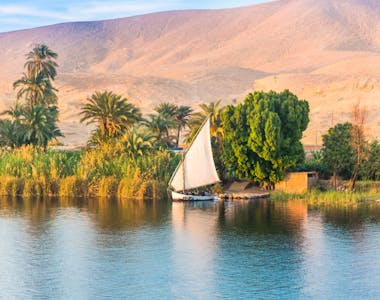

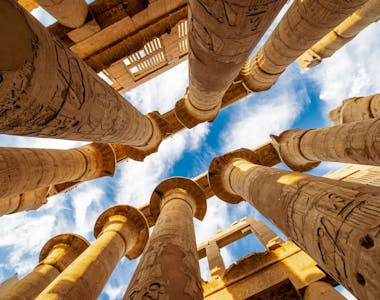

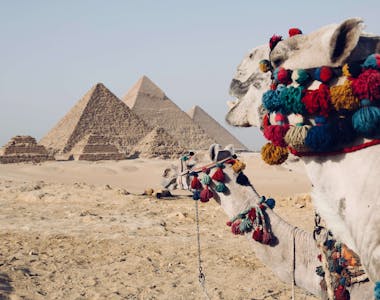
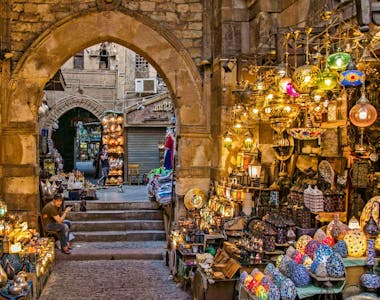
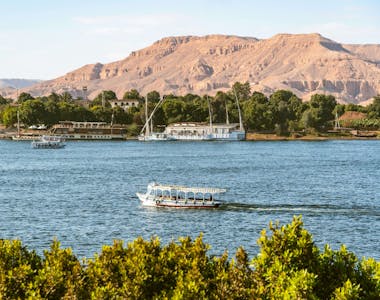
Book With Confidence
Monthly Payments
Spread the costs with no interest or additional fees
Best Price Guarantee
We won't be beaten on price. If you find this adventure at a lower price please get in touch!
Reserve now & pay later
Reserve your adventure today and pay later, free of charge
ATOL protected
Book with confidence
Hold your space today, for free
or book your trip with a deposit and then pay the rest in instalments.
Reserve your flights with us
Add flights to your booking and we'll take care of the rest. You'll get 24/7 support from our team & ATOL protection.
Speak to our experts
Call or email our expert team to find out more and help with ideas and planning.
